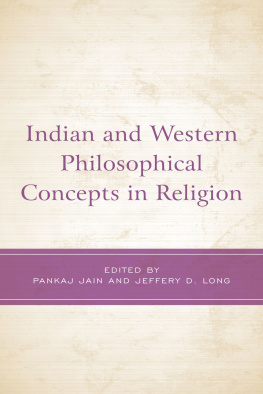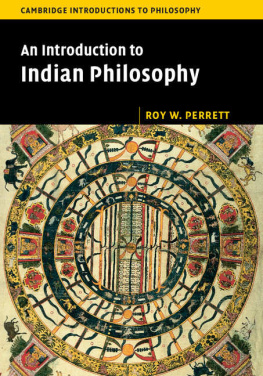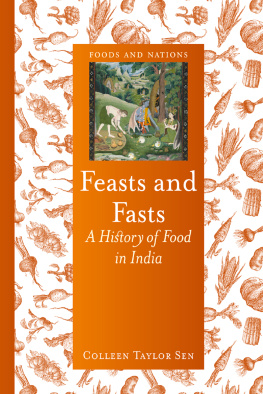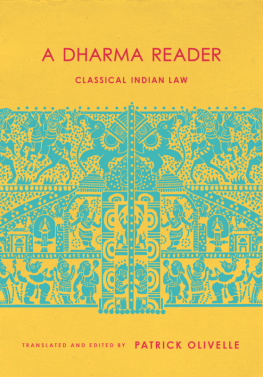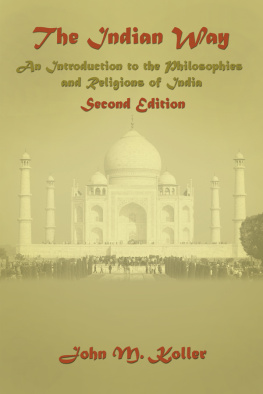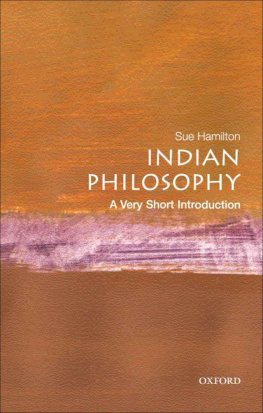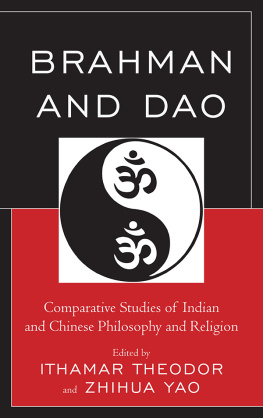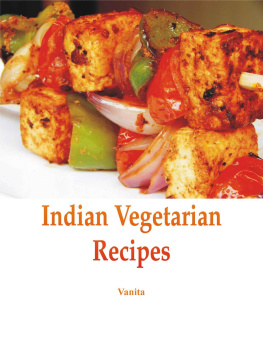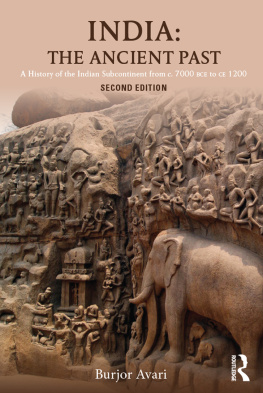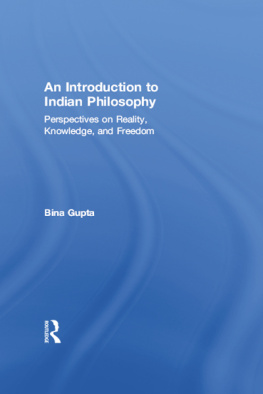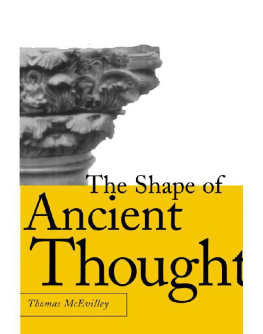THE INDIAN WAY
An Introduction to the Philosophies
and Religions of India
Second Edition
John M. Koller
First published 2009 by Pearson Education, Inc.
Published 2016 by Routledge
2 Park Square, Milton Park, Abingdon, Oxon OX14 4RN
711 Third Avenue, New York, NY, 10017, USA
Routledge is an imprint of the Taylor & Francis Group, an informa business
Copyright 2006, 1982 Taylor & Francis. All rights reserved.
All rights reserved. No part of this book may be reprinted or reproduced or utilised in any form or by any electronic, mechanical, or other means, now known or hereafter invented, including photocopying and recording, or in any information storage or retrieval system, without permission in writing from the publishers.
Notice:
Product or corporate names may be trademarks or registered trademarks, and are used only for identification and explanation without intent to infringe.
Credits and acknowledgments borrowed from other sources and reproduced, with permission, in this textbook appear on the appropriate pages.
ISBN: 9780131455788 (pbk)
Cover Design: Bruce Kenselaar
Library of Congress Cataloging-in-Publication Data
Koller, John M.
The Indian way : an introduction to the philosophies and religions of India/
John M. Koller.2nd ed.
p. cm.
Includes bibliographical references and index.
ISBN 0131455788
1. Philosophy, India. 2. IndiaReligion. 3. IndiaCivilization. I. Title.
B131.K56 2006
181.4-dc22
2004022433
Contents
Preface
For more than four thousand years, the peoples of the Indian subcontinent have been seeking the deepest truths about the nature of reality and the self, exploring the depths of human consciousness. Indias most brilliant thinkers and sincerest religious seekers have been preoccupied with the quest for perfection, for a way to transform this ordinary, limited, and imperfect existence into its potential greatness and perfection. Their insights and discoveries have shaped one of the worlds richest and longest-lived cultures.
Today, as we seek a wisdom that will enable the peoples of the world to live together securely and well as members of an interdependent global community and that will, at the same time, enable each of us to achieve our fullest personal growth, our need to explore and understand the profound insights of the Indian way is greater than ever.
What am I, in the deepest recesses of my being? How can I realize my full human and spiritual potential? These are the fundamental questions of life for all of us. Because they are also the questions that Indias sages have been pondering for the last four thousand years, an understanding of the Indian way is directly relevant to our attempts to improve our self-understanding and the quality of our lives.
Exploring the great ideas of the Indian tradition is a truly exciting intellectual adventure. But it is also an extremely practical adventure, for it will enable us to understand the basis for thinking and acting of one-sixth of the worlds people. Even more importantly, it is a way of holding up a cultural mirror, enabling us to see ourselves, our ideas and values, from a new perspective, thereby providing new insight into our own existence.
Writing this book has been simultaneously a way of expressing my gratitude for what I have received from the Indian tradition and a way of exploring this tradition further. The voices of Indias great thinkers, speaking through her rich philosophical and religious traditions, have revealed many wonderful secrets of the human heart and mind, enriching my personal existence and illuminating my own culture. This book is a way of sharing what I have received and inviting you to join in the exploration of the Indian way and the process of self-discovery. Throughout, I have attempted to let the Indian way speak for itself, to be its own voice, rather than to express my own opinions.
Acknowledgments
It is impossible to mention everyone who has contributed to The Indian Way, but I would be sorely remiss if I did not express my gratitude to the following people.
Among my teachers, Professors S. K. Saksena of the Universities of Lucknow and Hawaii and Charles A. Moore of the University of Hawaii initiated me into Indian studies, sharing freely their knowledge and wisdom while insisting on the highest levels of scholarship and philosophical rigor. Professor Kenneth Inada introduced me to the philosopical study of Buddhism, resisting all of my initial attempts to reduce Buddhism to an Asian version of Western thought. Professor T. R. V. Murti of Banaras Hindu University and Professor Kalidas Bhattacharya of Vishva Bharati University helped me more than they probably realized, both during the six weeks of the 1964 East-West Philosphers Conference and, later, when I came to their universities in India. To Professor George Artola I owe my initiation into Sanskrit without which much of the Indian tradition would remain closed to me.
John Schumacher, friend, colleague, and former student, shared in many of the discoveries and much of the excitement that made this book possible. His friendly criticismsand comments on nearly every page of an earlier draft improved the text considerably. Ashok Malhotra, good friend since our student days at the East-West Center, has shared many insights into the Indian way. His reading of the manuscript and suggestions for improvements were very helpful. Conversations with Romesh Diwan, a colleague for 35 years, helped shape my understanding of India in untold ways. Isadore Traschen, a colleague in the English Department, made very helpful suggestions concerning both style and substance. David Wieck, Charles Sanford, Dewitt Ellinwood, Theodore Wright, Alok Chakrabarti, J. Uppal, and David Applebaum each shared their reaction to one or more chapters. Rama Rao Pappu and Stephen Kaplan made valuable suggestions for the second edition based on their experiences with the first. Godabara Mishra has generously shared his knowledge of Indian philosophy with me during the many years of our friendship.
Finally, special thanks to Mimi for her critical reading of the manuscript, and especially for her love and support.
Many students have accompanied me on this journey of self-discovery and pilgrimmage along the Indian way. They have been my teachers as well as my students, and this book is an expression of my gratitude to them.
J.M.K.
Great Neck, N.Y.
Chronology
| B.C.E. | EVENTS, PERSONS, TEXTS |
| 30001800 | Indus (Harappan) civilization in Pakistan and northwest India; sometime during this period, perhaps early, perhaps late, the g Veda was composed and Vedic civilization flourished in this same area |
| 1500800 | Brhmaas and rayakas composed; Parva (Jain Trthakara) |
| 800600 | Urbanization; Early Upanisads composed; yoga practiced |
| 600400 | Mahvra, the Buddha, Crvka, early Skhya and Yoga; oral versions of Mahbhrata and Rmyana; Hindu Devotionalism |
| 400200 | Invasion of Alexander; Mauryan dynasty, beginning with Candragupta; King Aoka (r. 269232); beginning of the philosophical systems; dharma, kma and artha astras; Bhagavad Gt; Mahyna Buddhism |
| 2000 | Many invasions; ouga Dynasty ends (c. 71). Developments in the sciences and medicine; Devotionalism flourishes |


